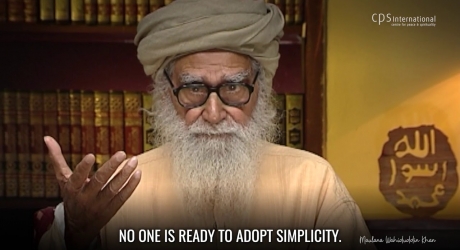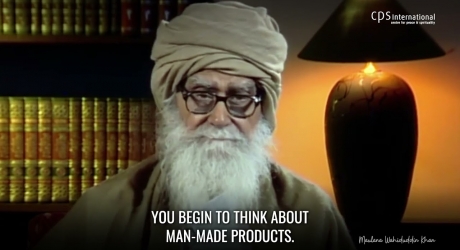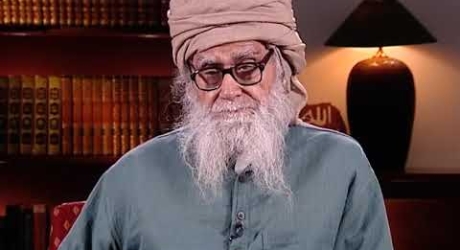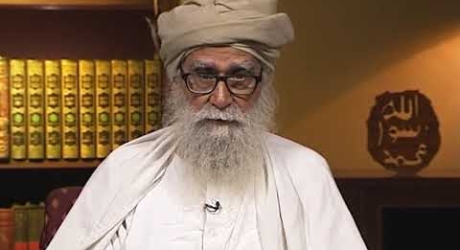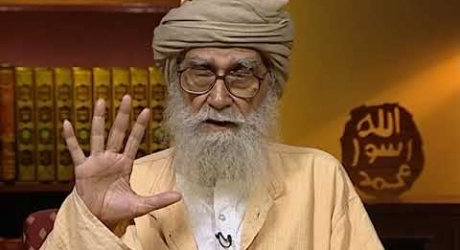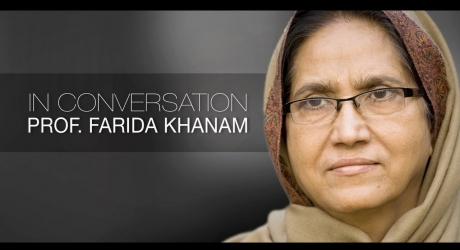Introduction
I visited the United States of America in June 2011 and stayed there for three weeks. During this period, many programmes were scheduled and I got a chance of interacting with many people. This led to many experiences, which I would share today
To begin with, I would like to share an important discovery about America. According to my assessment, America is technologically strong but spiritually (intellectually) weak. This is a big statement to make but my experiences in America have led me to this conclusion. For example, 1 always wanted to know why America adopted a policy which was not practical. Through my interactions this time, I learnt why.
America's changed policy
Between the First and the Second World Wars, the policy of America was: "The business of America is business. However, after the Second World War, the goal of America changed to: The business of America is global leadership. The change of goal was not a wise policy. It must be remembered that politics is the art of the possible and the first thing to assess therefore is the practicality of the result; one who does not consider the outcome is adopting an unwise approach. In the case of America, while the policy up till the Second World War was a wise one, the policy after that was not so. In the first case, the goal of America ensured that they were not in conflict with anyone; it was only a matter of give and take from people. But in the concept of world leadership, conflict with others was imperative. If one seeks dominance over everyone else, then rivalry, opposition and reaction from others necessarily follow. This is what transpired as a result of the changed American policy, While America progressed until the Second World War, its economy dwindled soon after. Today, people all over the world harbour negative thoughts about America; a price for seeking world leadership.
Experiences from interactions
Whenever I meet people, I ask them their experiences in life. During the three weeks of constant interaction in America, I met no one who could share meaningful experiences with me. Experience is a form of intellectual wisdom, which looks at drawing meaningful lesson from the occurrences in our surroundings. In America, I found that while people were professionally sound, dressed exquisitely and lived lavishly yet, they could not share a meaningful experience.
For example, I asked a Mustin who has been living there fie twenty-five years about his experiences. He said, "Before 9/11, we lived very comfortably however, after 9/11 and freedom" Bot, this was not an experience, it was a complains. Experience sharing is about sharing positive lessons from life's events. I asked the same question to another person who had been residing in America for sixteen years. He replied, "I remember my home, a lot?” this too was not on experience as there was no learning in it.
Opposite to the place where I stayed in America, was a huge complex where senior citizens lived. One day, a member of our team walked up to that complex. He was however stopped and told that it was private property. The American did not realise that he had a potential opportunity to learn by interacting and exchanging with a non-American. Contrarily, he looked at him as a trespasser and refused him entry.
Why do Americans lack spirituality?
My experiences in America made me contemplate over the reason because of which people in America were so far from spirituality and learning. I then recalled the following verse of the Quran which refers to ribaa (banking interest):
God blights usury and blesses charitable deeds. (2:276)
According to this verse, God diminishes ribaa or usury. I always had this question in mind that what can possibly be the "loss" in a ribaa (interest)-based economy? According to the various commentaries of the Quran (tafsir), the above verses means that a ribaa-based economy will not flourish. However, this explanation is not acceptable to the modern man because he sees that the progress of the modern economy is almost entirely based on the progress of banking system. Any industrial venture seeks huge investment and this capital is lent by the banks at specific rates of interest. In other words, in the absence of banking system, all the progress that we see today, would not have come to pass. Criticizing such a system, therefore, does not address the modern mind. But the question remains - what is the "loss" that is referred to in the Quran?
I got the answer to this question in my recent visit to America. Until now, the commentators of the Quran had understood the above verse in terms of economic loss only. They thought that any economy that operates through a usury or interest-based system, will not prosper. My experiences made me realise that this verse actually refers to another kind of loss, which is the "intellectual" loss. In other words, the loss incurred in a ribaa-based economy was not economical but intellectual loss
What leads to intellectual loss?
Back in 1967, when I first visited Delhi, the time of on the paper had given account of his experiences after his recent visa to the United States of America. He wrote that all those residing in America were indebted because in order to meet the lifestyle expectations, they k various loans ranging from a house loan to a car or an education bon. After this, the process begins whereby the go on earning money to clear off the debts. The editor had criticized this lifestyle of being in debt.
1 experienced this myself. When I visited America for the first time, a young acquaintance of mine came to take me for sight-seeing in his luxurious car. While talking to him I discovered that both this car and his home had been bought on loan. I criticized such a system of taking loans but my young acquaintance did not quite agree with my point of view. He said that when a person steps in the outside world, he may not have money for all these luxuries. However, as soon as he gets a job, the bank offers him all amenities on loan. Then, as he starts earning, he can pay back the money to the bank in instalments.
This time, I observed the lifestyle of people in America very closely and realised that nothing had changed. People continue to be indebted to lending institutions and were earning money day in and day out to pay back the debt. This is the singular mission of their lives. People work in multiple shifts and immerse themselves in business completely in order to maintain their provisions. As such, they do not have an intellectual life. They live a one-sided life: they continue to feed their physical self (through luxurious living, material comforts, exquisite lifestyle) while starving their intellectual self.
In order to develop intellectually, it is essential to engage in study, involve oneself in interaction and exchange. But in America, massive mechanization and automation have rendered no room for exchange. Learning through informal interaction is absent in totality.
I would like to point out here that there are three chief sources of intellectual development. These are: observation, study and exchange. Unfortunately, the American lifestyle does not have time to make use of any of these sources. Their lifestyle is most conducive for providing more and more earning opportunities which subsequently lead to enhancement of material comforts. So, while physically this has made the Americans very strong, intellectually it has rendered them very weak.
Muslims in America: intellectually backward
An example of this intellectual backwardness can be clearly seen among the Muslims Tving in America. Because immigrants work in almost all fields in America, they think that immigrants like them have made America strong. This to me is an example of living in sheer fallacy.
It is not difficult to understand why this belief is fallacious. These very immigrants, who claim to have led America to progress, failed to develop their own countries. The question remains who then led America to development? The answer is: it was not Mr. Immigrant who directed America to the path of progress, in reality, it was Mr. Incentive who led America to progress and development.
The American policy focuses on incentivization. If one works meritoriously, one will receive due recognition. In most countries, merit is superseded by nepotism and corruption but when people immigrated to America, they realised that if they worked hard and distinguished themselves, they will receive recognition. So, they strove hard and took advantage of America's incentive-based system. If the same system develops in India, it will progress too. The immigrants themselves are not aware that it was incentive that developed America and not they. This is another example of how life in America has contributed to the development of a stronger lifestyle and a weaker intellect.
This analysis made me understand the above verse of the Quran which points out the intellectual loss that is incurred through an interest-based economy. An example of it is America where the materially rich lifestyle has converted people into money-earning factories, devoid of wisdom.
A universal truth
My visit to the Sears Tower gave me a great learning. I reminisced how on September 11, 2001, the World Trade Centre in New York were ruthlessly subjected to a terror attack. Before 2001, the twin towers were considered to be the glory of America. Those who destroyed them did so thinking that their act will bring down America's glory.
When I saw the Sears Tower, I remembered the British saying: ‘The king is dead. Long live the king!’ This saying means that the king is dead however, kingship will continue. I thought that though the New York Tower was destroyed, the Chicago Tower was still standing. In other words, I discovered that: "The American glory is demolished. Long live the American glory!"
This experience made me learn a universal truth: one cannot destroy anybody by routing material Harm. The history of human beings played before my eyes. Examples of it and through centuries of human civilisation. For example, the Tartare destroyed the Muslim empire in the 11th century. But the Muslim empire re-emerged, it even absorbed the Tartars within itself. Similarly, America bombarded Japan, however, today Japan is an economic superpower.
This universal truth discards the fallacious ideas enshrined in the minds of suicide bombers and terror attackers. They wrongly believe that inflicting material loss through suicide bombing or other such activities is harmful whereas the reality is that material loss is not irreparable. They fail in understand that man can sustain all material loss and using violence therefore is futile. Man can only be subdued through an ideology. For example, Arabs were conquered by the ideology presented by the Prophet Muhammad, similarly, Muslims overpowered the Tartars through the Islamic ideology. Thus. 1 understood the importance of ideological work (dawah work) in Islam. A Western scholar who studied Islam and its spread, commented thus: "The religion of Muslims conquered where their arms failed.
Why do people adopt Islam?
During my interaction with people who had adopted Islam, I enquired about what led them to do so since Islam was always in news for all the wrong reasons - from suicide bombing to violence.
I then understood a law of nature: there exists a positive for every negative. The Muslims were clearly wrong in perpetrating acts of violence. However, the positive result of this negative occurrence was that it brought Islam in news and created curiosity in minds about it. People thus want to know Islam: they want to know who are these people who are killing themselves, what are their beliefs, what motivates them to perpetrate violence, etc. When such people study Islam, they realise that the violence done by Muslims in the name of jihad is clearly wrong and unislamic. They realize that Quran doesn't ask Muslims to engage in violence. For example, while reading the Quran they reach the following verse:
Whoever killed a human being-except as a punishment for murder or for spreading corruption in the land-shall be regarded as having killed all mankind. (5:32)
This verse of the Quran clearly denounces the violent acts of present-day Muslims. It becomes clear to the reader that what Muslims are doing, is of their own accord, it is not what the Quran is asking them to do. Such people who discover Islam as an ideology then adopt it in their way of living.
Identifying opportunities
While global leadership was not a favourable target for America, it presents a great opportunity for a dayee. The opportunity is that the increased interaction between America and other nations has made America an "international seat (aalami markaz)" For a dayee whose mission is to deliver the message of God to mankind, America has become the best place to do dawah work. The founding fathers of America laid greatest emphasis on communications and transport. Today America has perfect communication mechanism and the best roads. An example of this development is the Global Positioning System (GPS), GPS is a space-based global navigation satellite system that provides location and time information in all weather, anywhere on or near the Earth, where there is an unobstructed line of sight. It is maintained by the United States government and is freely accessible by anyone with a GPS receiver.
The Muslims living in America are standing on the threshold of dawah opportunities. At present. seven million Muslims reside in America. It is there chance to fulfil their obligation towards God of disseminating His message to mankind. All the messengers addressed the mala-e-quam (the leaders among their people). The Islamic way seeks to first address the opinion makers or intellectuals. Once they get addressed, the message percolates to all others in the society. In today's age, America is the mala-e-quam: it has made English an international language; if the American market fluctuates, it affects the entire world. In other words, American doings have a clear implication on rest of the world.
The dayees in America must understand that America holds the position of being the mala (leader) of the modern age. God has given the American Muslims a readymade 'mala'. If a person wants to establish a global centre, he will never be able to do so by his own efforts. The American target of world leadership has made it a global centre. The Muslims living there must avail the opportunity of doing dawah work or they will have no answer to give on the Day of Judgement.
The following analogy is most apt for this situation. The rain never announces: ‘O farmers! go to your land and sow seeds.’ When it rains, the farmer has to discover himself that an opportune moment for agriculture has arrived. Similarly, today America has become the world seat, but it won't announce that: 'O dayees, engage yourself in dawah work.’ God made America a global centre and the Muslims who are settled there must avail this opportunity or else they will be accountable before God for failing to do dawah work.
Conclusion
The immigrant Muslim population of America harbours the same idea with which they lived in the subcontinent. Let me quote an experience to clarify my point. While in America. I was called to deliver a lecture at a mosque. As soon as I finished speaking, a youth in the audience stood up began complaining over a mater. The imam of the mosque who was also the moderator tried us intervene but this youth refused to become quiet. In his rage, he walked till the stage and said about me: "He cited the Prophet ten times and never said peace be upon him.” this was the mindset of a young Muslim, born and brought up in America. My earlier impression was that such sentimental people were only a product of the subcontinent but after this experience I realised that this was a case of present-day Muslims, world over.
This incident made me discover a sad fact about the present generation of Muslims in America. These Muslims did not live in America, but in their houses. They ventured into the American society only to seek jobs from institutions; their thinking however was a product of their households. They ate the same food, had the same culture but could not develop the scientific temperament as is found in the Americans. This is because Muslims live in ghettos. It is important to differentiate between a person's job or profession and his thinking. The Muslims go to America for job, while, their thinking remains backward. Let me take an example. During my speech at a Muslim institution in America, I said: "Muslims live in America but do not have patriotism for it." Those among the audience said that while the older generations were much attached to their home countries, the next generation which was born and brought up in America was patriotic towards the country. I met an American youth and asked him: "Do you love America?" He said, "Yes, I do love America." I asked him whether he knew what love was. He said that love is a feeling. I said: "No, love is strong affection. Do you have strong affection for America?" Then he said that he did love America but with some reservations, because America interfered in the matters of Muslim countries, and supported Israel, etc. I told him that this was not patriotism. Patriotism has to be unconditional. Such a mindset was a by-product of living in their ghettos instead of the American society. I for example, have always tried to learn more about the American society during my visits.
Towards the end, I would like to reiterate my observation that while America is physically a strong nation, it is weak intellectually. However, it holds immense opportunities for international dawah work. May the Muslims in America avail the God-given opportunity and utilise America's global position for dawah work.





